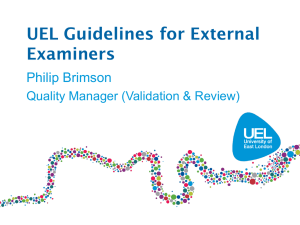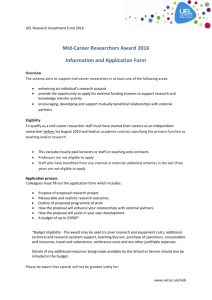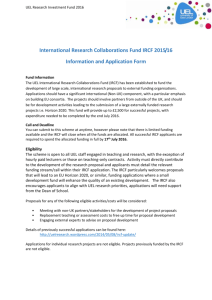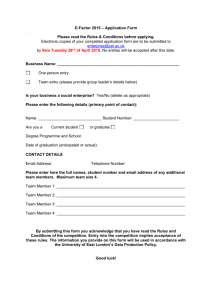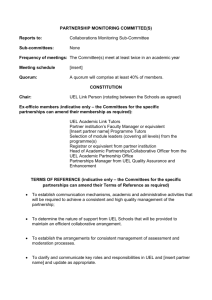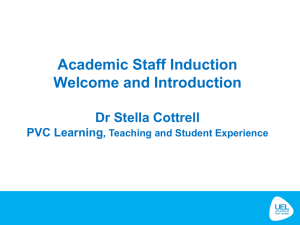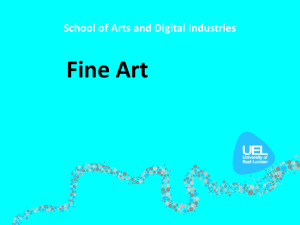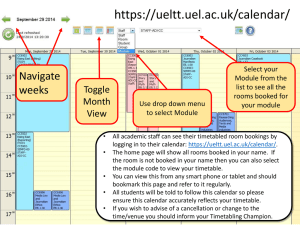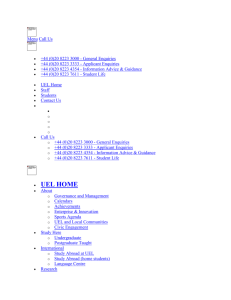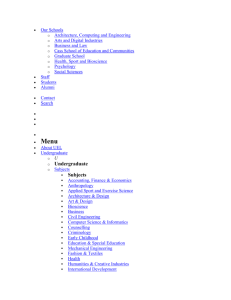Professional Doctorate Programme Specification Template
advertisement
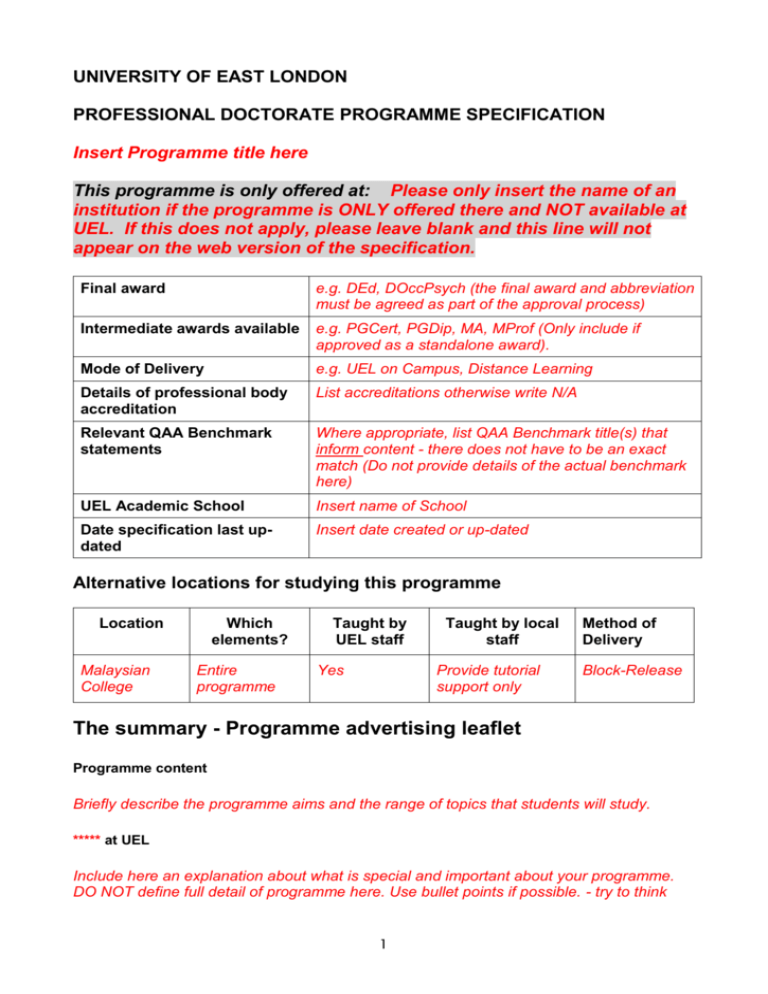
UNIVERSITY OF EAST LONDON PROFESSIONAL DOCTORATE PROGRAMME SPECIFICATION Insert Programme title here This programme is only offered at: Please only insert the name of an institution if the programme is ONLY offered there and NOT available at UEL. If this does not apply, please leave blank and this line will not appear on the web version of the specification. Final award e.g. DEd, DOccPsych (the final award and abbreviation must be agreed as part of the approval process) Intermediate awards available e.g. PGCert, PGDip, MA, MProf (Only include if approved as a standalone award). Mode of Delivery e.g. UEL on Campus, Distance Learning Details of professional body accreditation List accreditations otherwise write N/A Relevant QAA Benchmark statements Where appropriate, list QAA Benchmark title(s) that inform content - there does not have to be an exact match (Do not provide details of the actual benchmark here) UEL Academic School Insert name of School Date specification last updated Insert date created or up-dated Alternative locations for studying this programme Location Malaysian College Which elements? Entire programme Taught by UEL staff Yes Taught by local staff Provide tutorial support only Method of Delivery Block-Release The summary - Programme advertising leaflet Programme content Briefly describe the programme aims and the range of topics that students will study. ***** at UEL Include here an explanation about what is special and important about your programme. DO NOT define full detail of programme here. Use bullet points if possible. - try to think 1 about how the student experience at UEL will differ from elsewhere - what are the main selling points? Entry requirements Briefly describe the admissions requirements and the process of admission e.g. interview. In addition to your own text, you must include the following statements (the IELTS score is the minimum requirement and may be amended upward at (re)approval): Identify any aspects of the programme (and its assessment) that may require reasonable adjustments for students with disabilities and/or particular needs. At least two members of academic staff will review each application before a decision is made. Applicants with either prior-certified learning or prior-experiential learning that closely matches the specified learning outcomes of the taught part of the programme may be able to claim exemption via agreed university procedures. No exemption can be claimed against the research part of the programme or in situations where a professional body excludes it. Where English is not the applicant’s first language, a minimum IELTS Academic English, or such qualifications as our University deems comparable, score of 7.0 overall, with a minimum of 6.5 in all components, is required at entry. Such assessment of English language competence must normally have been undertaken no more than two years prior to application, though relevant and more recent study in a United Kingdom Higher Education Institution may be accepted as sufficient proof of ability. Programme structure Brief statement e.g. 1/2 year, SW/FT/PT, Flexibility in module choice. Work for exhibitions or fashion show? Learning environment Seminar/practical based, workshop, studio, laboratory space, external visits, overseas study, field programmes, distance learning, web-based learning etc Assessment Brief note on broad proportion of coursework and exams. Is each module assessed or does assessment of the whole year take place through an end of year show etc? What contributes to the final award classification. Students with disabilities and/or particular learning needs should discuss assessments with the Programme Leader to ensure they are able to fully engage with all assessments within the programme. Relevance to work/profession 2 Explain how the programme relates to professional experience. Can projects/assignments be placement based? Research/project work Contribution this makes to overall assessment, possibly give examples. Give indicative word lengths for the thesis. In addition to your own text, you must include the following statement: Registration of the research component can only take place following a recommendation from the relevant School Research Degrees Sub-Committee to the university Research Degrees Subcommittee of the suitability of the candidate to undertake research, of the programme of research, of the supervision arrangements and of the research environment. These approvals require appropriate academic judgement to be brought to bear on the viability of each research proposal. Candidates for a Professional Doctorate must successfully complete all assessed elements of their programme before award of the degree can be made. Once the research stage of the programme is reached progression will be formally reviewed annually by a Panel comprised of staff with appropriate academic and professional expertise who are independent of the candidate’s supervisory team. The School Research Degrees Sub-Committee and the university Research Degrees Subcommittee monitor the reports from these Panels. The examination of the research component of the Professional Doctorate has two stages: firstly the submission and preliminary assessment of the research; and secondly its defence by oral examination. Added value Include any advantages of studying this programme e.g. professional body exemptions Your future career Give examples of career paths and professional qualifications/memberships available as a result of the programme How we support you Give examples including personal tutor support, research methods training, access to relevant learning materials. Personalise to your programme as much as possible. In addition to your own text, you must include the following statement: The Graduate School is responsible for providing a focus to the support of our postgraduate research students and for our institution’s research and scholarly strategy. Professional Doctorate students will have at least two and not normally more than three supervisors, who together demonstrate an appropriate range of academic and professional 3 experience. One supervisor shall be the Director of Studies with responsibility to supervise the candidate on a regular and frequent basis. Bonus factors (Include this section where relevant) e.g. overseas exchanges, placement opportunities, exposure to industry, location/environment Any other special opportunities your programme will give Additional guidance to authors This part of the specification will be a key document in putting together promotional material about your programme. It may be used to produce programme leaflets or material on our web pages. It should be regarded as an outline of a book or as a 'trailer' to a film. Give the flavour but not all of the detail .i.e. enough to want to buy the book or see the film. More detail about the programme can be provided elsewhere on our web pages if necessary. Try to write between 50-200 words under each heading. Use bullet points to give 'bite sized' information where appropriate You can include additional headings if needed Those which can be omitted are marked with an asterisk. Programme aims and learning outcomes What is this programme designed to achieve? This programme is designed to give you the opportunity to: Include the overall aims of the programme here using bullet points. These are the overall aims and usually there will be no more than three or four of them Aim one Aim two Aim three Aim four What will you learn? State the overall learning outcomes for the programme here. Divide them into four: knowledge (usually subject-based); thinking skills (i.e. cognitive/intellectual); subject-based practical skills (e.g. interpret quantitative data, complete a small-scale research project, read a map, use computer-aided design technology to design a piece of equipment etc) and skills for life and work (sometimes called 'key skills' or 'transferable skills' or 'generic skills'). The categories follow those that we have adopted across our University. The headings have been modified to make them more accessible to a lay audience. You may already have much of this information in student handbooks on in the Self-Assessment Document that you were required to submit for review processes. 4 In addition to your own text, you must include the following learning outcomes which define our PhDs: A candidate who is awarded a Professional Doctorate will be expected to have achieved the following learning outcomes: Created and interpreted new knowledge, through original research, or other advanced scholarship, of a quality to satisfy peer review, which extends the forefront of the discipline and merits publication; Systematically acquired an understanding of a substantial body of knowledge which is at the forefront of an academic discipline or area of professional practice; The general ability to conceptualise, design and implement a project for the generation of new knowledge, application or understanding at the forefront of the discipline and to adjust the project design in the light of unforeseen problems; A detailed understanding of applicable techniques for research and advanced academic enquiry; Ability to make informed judgements on complex issues in specialist fields, often in the absence of complete data, and be able to communicate their ideas and conclusions clearly and effectively to specialist and non-specialist audiences: Ability to continue to undertake pure and/or applied research and development at an advanced level, contributing substantially to the development of new techniques, ideas or approaches; The qualities and transferable skills necessary for employment requiring the exercise of personal responsibility and largely autonomous initiative in complex and unpredictable situations, in professional or equivalent environments. Use bullet points Knowledge Thinking skills Subject-Based Practical skills Skills for life and work (general skills) 5 The programme structure Introduction All programmes are credit-rated to help you to understand the amount and level of study that is needed. One credit is equal to 10 hours of directed study time (this includes everything you do e.g. lecture, seminar and private study). Credits are assigned to one of 5 levels: 3 4 5 6 7 8 equivalent in standard to GCE 'A' level and is intended to prepare students for year one of an undergraduate degree programme equivalent in standard to the first year of a full-time undergraduate degree programme equivalent in standard to the second year of a full-time undergraduate degree programme equivalent in standard to the third year of a full-time undergraduate degree programme equivalent in standard to a Masters degree equivalent in standard to a Doctorate degree Credit rating The overall credit rating for this programme is 540 credits for the Professional Doctorate. Typical duration On some programmes it is possible to move from full-time to part-time study and viceversa to accommodate any external factors such as financial constraints or domestic commitments. Many of our students make use of this flexibility where it is available and this may impact on the overall duration of their study period. You must include the following statement: The normal minimum and maximum periods of registration for a Professional Doctorate are as follows: Full-time Part-time Minimum Maximum 33 months 45 months 48 months 60 months How the teaching year is divided 6 Explain how the programme is taught across each year. You may need to structure this explanation by the years of the programme and differentiate between f/t and p/t mode. What you will study when Include structure diagram showing when modules are studied, whether they are core or optional, if appropriate, identify the number of option modules allowed. Include reference to the credit rating of modules List all the taught, credit rated modules indicating their status. Some of the boxes below have been completed to illustrate how to complete this section but please overwrite these with your own data.. Level UEL Module Code 7 7 8 8 8 Module Title Credit Status* Advanced Programme Specifications Writing your research proposal Advanced qualitative analysis How to map gravity 30 Core 30 Core 30 Core 30 Core Professional practice 60 Core *Please Note - A core module for a programme is a module which a student must have passed (i.e. been awarded credit) in order to achieve the relevant named award. An optional module for a programme is a module selected from a range of modules available on the programme. Requirements for gaining an award Not all of this text will be relevant. It depends on what, if any, intermediate awards the programme offers. In order to gain a Postgraduate Certificate, you will need to obtain 60 credits at Level 7. In order to gain a Postgraduate Diploma, you will need to obtain 120 credits at Level 7. In order to obtain a Masters, you will need to obtain 180 credits at Level 7. These credits will include a 60 credit level 7 core module of advanced independent research. Masters Award Classification 7 Where a student is eligible for an Masters award then the award classification is determined by calculating the credit-weighted arithmetic mean of all marks on the current enrolment and applying the mark obtained as a percentage, with all decimals points rounded up to the nearest whole number, to the following classification; 70% - 100% 60%- 69% 50% - 59% 0% - 49% Distinction Merit Pass Not passed Further information List here any further information that you think would be helpful. Teaching, learning and assessment Teaching and learning List here the key teaching and learning methods used. In order to demonstrate that you have covered the learning outcomes it may be useful to sub-divide this as follows Knowledge is developed through Thinking skills are developed through Practical skills are developed through Skills for life and work (general skills) are developed through An alternative approach would be to list the teaching and learning methods and use bullet points to indicate which of these were relevant to the range of learning outcomes listed above Assessment List here the assessment methods that you use. Once again, in order to demonstrate that all learning outcomes are assessed, it might be helpful if you use one of the approaches 8 suggested above. Examples of forms of assessment include coursework, presentations, case studies. Knowledge is assessed by Thinking skills are assessed by Practical skills are assessed by Skills for life and work (general skills) are assessed by How we assure the quality of this programme Before this programme started Before this programme started, the following was checked: there would be enough qualified staff to teach the programme; adequate resources would be in place; the overall aims and objectives were appropriate; the content of the programme met national benchmark requirements; the programme met any professional/statutory body requirements; the proposal met other internal quality criteria covering a range of issues such as admissions policy, teaching, learning and assessment strategy and student support mechanisms. This is done through a process of programme approval which involves consulting academic experts including some subject specialists from other institutions. How we monitor the quality of this programme The quality of this programme is monitored each year through evaluating: external examiner reports (considering quality and standards); statistical information (considering issues such as the pass rate); student feedback. Drawing on this and other information, programme teams undertake the annual Review and Enhancement Process which is co-ordinated at School level and includes student participation. The process is monitored by the Quality and Standards Committee. 9 Once every six years an in-depth review of the whole subject area is undertaken by a panel that includes at least two external subject specialists. The panel considers documents, looks at student work, speaks to current and former students and speaks to staff before drawing its conclusions. The result is a report highlighting good practice and identifying areas where action is needed. The role of the programme committee This programme has a programme committee comprising all relevant teaching staff, student representatives and others who make a contribution towards the effective operation of the programme (e.g. library/technician staff). The committee has responsibilities for the quality of the programme. It provides input into the operation of the Review and Enhancement Process and proposes changes to improve quality. The programme committee plays a critical role in the quality assurance procedures. The role of external examiners The standard of this programme is monitored by at least one external examiner. External examiners have two primary responsibilities: To ensure the standard of the programme; To ensure that justice is done to individual students. External examiners fulfil these responsibilities in a variety of ways including: Approving exam papers/assignments; Attending assessment boards; Reviewing samples of student work and moderating marks; Ensuring that regulations are followed; Providing feedback through an annual report that enables us to make improvements for the future. The external examiner reports for this programme are located on the UEL virtual learning environment (Moodle) on the School noticeboard under the section entitled ‘External Examiner Reports & Responses’. You can also view a list of the external examiners for the UEL School by clicking on the link below: http://www.uel.ac.uk/qa/externalexaminersystem/currentexaminers/ Listening to the views of students The following methods for gaining student feedback are used on this programme: List the methods that you use e.g. Module evaluations Student representation on programme committees (meeting 6 times year) Student/Staff consultative committee (meeting 3 times a year Students are notified of the action taken through: List the methods that you use e.g. 10 circulating the minutes of the programme committee a newsletter published three times a year providing details on the programme noticeboard Listening to the views of others The following methods are used for gaining the views of other interested parties: List the methods that you use e.g . Questionnaires to former students Annual student satisfaction questionnaire Industrial liaison committee Placements Officer Regular liaison with professional bodies Further information Include here any specific information relevant to your programme/school.. Where you can find further information Further information about this programme is available from: The UEL web site (http://www.uel.ac.uk) The student handbook (give web-site where available) Module study guides (give web-site where available) UEL Manual of General Regulations (http://www.uel.ac.uk/qa/policies/manual/) UEL Quality Manual (http://www.uel.ac.uk/qa/policies/qualitymanual/) The Graduate School (http://www.uel.ac.uk/gradschool/) School web pages (give web-site address) Add any other information sources that you think would be helpful 11

